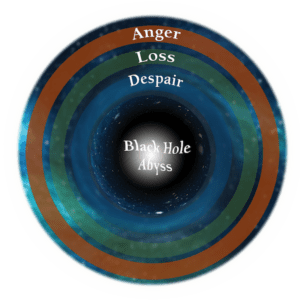When you are threatened or what you love is threatened, or you think you may be threatened, anger is triggered. When we take a moment to look more closely at anger, we can see how other emotions are nested inside it. Anger is on the surface, but deeper than the surface there are other emotions.

You know what anger feels like. You know the adrenaline in your system. You know the heat of anger. With anger, there is often a command to do something, to lash out. You also know how to control anger. It is very useful to control anger. But there is another possibility—you can dive into and under anger.
Just under the surface of anger, often there is fear. In your willingness to inquire, “What is under the anger?” you can dive under your anger and actually experience fear. By experience, I don’t mean act it out or dramatize it or shake in a corner. The purpose of our inquiry is simply to be aware that there is fear (or some other emotion) under anger. Then you have the capacity to open and discover what is underneath each emotion that is revealed. Just as fear was under anger, under fear there is usually sadness, or a sense of loss.

In the willingness to not dramatize the anger or the fear or the sadness, but rather in a sober way to feel what it means to be absolutely sad (or fearful, etc.), you will discover that under sadness is often a black abyss. If you are willing to directly discover that abyss, to open to that, you will discover under that abyss is peace and freedom. Not freedom from emotions, not freedom from the abyss of despair or grief or sadness of loss, or the fear of more loss, or the anger at the reality of loss. Not freedom from those emotions, but freedom underneath all of those emotions.
Normally in our lives we are distracted by the drama of our emotions and the dramatic narrative that gets attached to these emotions. As you approach an emotion, certainly there will be some story or thoughts attached to it, including what you think about the emotion itself. You may feel victimized by the emotion or you may feel like you did the victimizing, and that’s all part of the story about the emotion.

For the purposes of inquiry, I’m inviting you to just push the story over to the side. The story has its uses and there may be great insight in the story. But for the purpose of discovering the substance of the emotion, and discovering how that emotion is layered with other emotions, the story is not useful. Just for this particular session, just for now, let your attention move from what you’re saying about your emotions to directly feeling them, experiencing them, and then discovering what’s underneath them.
The possibility is to recognize when the drama is stirred up that you have the capacity to turn your attention back to exactly what you are feeling. Each time you stop and inquire, you’re developing your capacity to recognize what you are feeling.